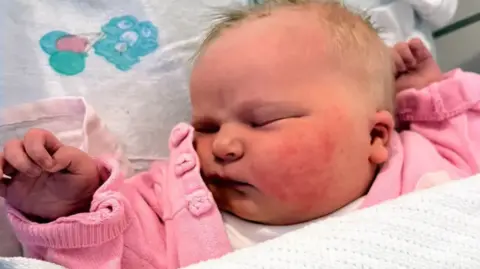Coroner concerned about 999 delay after baby death
 Family handout
Family handoutA coroner has voiced concerns about how long it took for a 999 call to be answered and an ambulance to arrive when a newborn baby fell critically ill.
Wyllow-Raine Swinburn died five minutes after arriving at Oxford's John Radcliffe Hospital in September 2022.
An inquest heard her mother spent eight minutes on an unanswered call and waited a further 30 minutes for an ambulance to arrive.
Coroner Darren Salter said there was a risk of future deaths unless action was taken. South Central Ambulance Service (SCAS) said it had since made changes.
The inquest heard Wyllow-Raine had been born via a caesarean section on 27 September and appeared to be healthy.
In evidence given by her grandmother, Anna Fisher, three days later the infant was crying when she was taken to bed at the family home in Didcot.
Wyllow-Raine's mother, Amelia Pill, had phoned her in the early hours of 30 September to say the baby did not appear to be breathing.
Her statement described how Ms Pill was "shouting down the phone and begging for someone to answer" as she waited on the phone after dialling 999.
Also during the inquest Prof Simon Mitchell, an independent consultant in neo-natal medicine, said it was "probable" the ambulance delay did not contribute to Wyllow-Raine's death.
Prof Richard Lyon, an emergency department consultant, also said the prospects of survival after the baby went into cardiac arrest were likely less than 1%.
Mr Salter recorded a narrative verdict, with death being caused by "congenital hyperinsulinism and hypoglycaemia leading to cardio-respiratory arrest".
'Very significant demands'
In his prevention of future deaths report, Mr Salter said he appreciated there had been "very significant demands" on SCAS.
He wrote: "I realise there will be occasions when ambulance resources, particularly in the early hours when there are fewer resources, happen to be located in a different area, leading to prolonged response times.
"It would seem that the issue of the delay in being connected to an emergency call taker is more amenable to a systems improvement, particularly when one considers that arrangements are in place for calls to default to other ambulance services who may be less busy, or who have greater capacity."
'Regrettable'
In a statement, SCAS said: "We recognise that waiting so long for their call to be answered and for the ambulance to arrive must have been awful and it is not the service that we aim to deliver."
It said the "regrettable response time" was due to "significant demand" at the time, but it had since made service improvements to increase its ability to respond "in a timely manner".
It said it had increased the number of call takers, reducing the average call delay from 50 seconds in September 2022 to 10 seconds by September 2024.
SCAS said it had also introduced "new processes" with local hospitals to ensure that ambulance crews were not delayed by more than 45 minutes when arriving at hospitals with a patient, so that more crews were available "to respond to the most serious emergencies more quickly".
It added: "Whilst this does not change the experience for Wyllow-Raine's family, we hope that they recognise that we are doing everything that we can to try and ensure that no other family goes through the same experience as they did."
You can follow BBC Oxfordshire on Facebook, X (Twitter), or Instagram.
